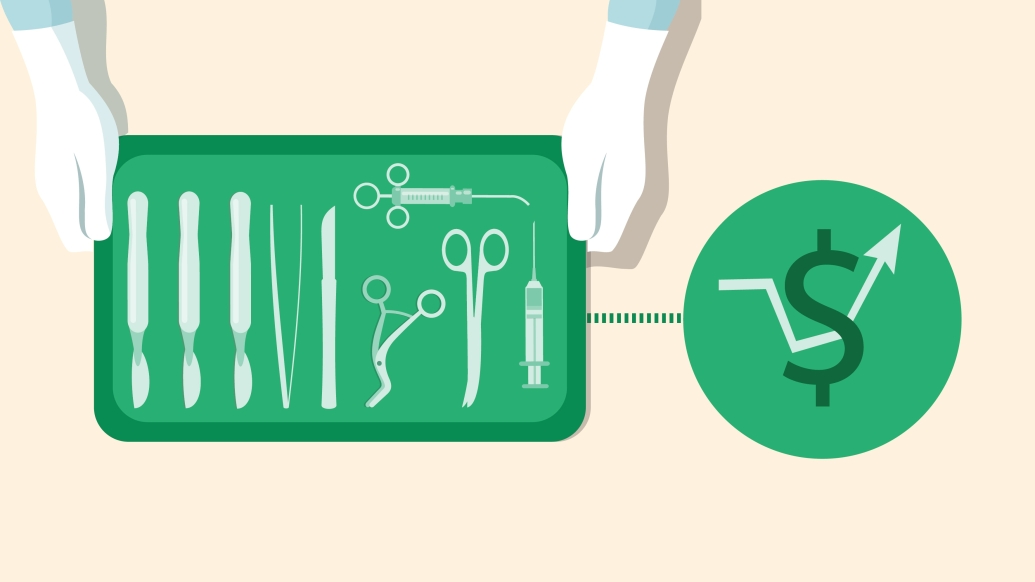Complication-related costs for common operations run two to three times higher at some hospitals, which tend to have higher complication rates, too.
7:00 AM
Author |

Major surgery can bring major risks, including complications that can crop up hours, days or even weeks after the patient leaves the operating room. They can be deadly, or require far more care before the patient recovers.
SEE ALSO: Even with Insurance, Hospital Patients May Pay Over $1,000 for Stay
A new study shows just how much that care can cost, in the hospital and beyond, and how widely hospitals can vary in ability to keep patients from suffering, or dying, from the same complications.
Hospitals also vary widely — as much as two- or threefold differences in some places — in what they're paid for patients with the same complications from the same operation.
The study also finds for the first time that hospitals with the highest care costs also tend to be where patients suffer the most complications — a surprise to researchers.
"We can see substantial variation in care, and cost, after a major complication occurs, even when we account for the type of complication and other factors," says senior author of the study and U-M surgeon Hari Nathan, M.D., Ph.D.
In the new paper published online in JAMA Surgery, Nathan and colleagues from the University of Michigan Medical School and Institute for Healthcare Policy and Innovation analyzed Medicare records from more than 576,000 people older than 65 who had four common operations. All had either a hip replaced, an aortic aneurysm repaired, or a section of lung or intestine removed on an elective basis over a four-year period ending in 2012.
More than 1 in every 10 Medicare-covered patients who had an aorta, lung or intestinal operation during this time experienced one of the eight major complications the team studied, including infections, blood clots, serious bleeding, pneumonia, heart attack and lung or kidney failure. Just over 1 in 50 of the hip replacement patients did, too.
Not surprisingly, but for the first time, the researchers show that Medicare paid more for patients who suffered a major complication — and paid more for patients who survived a major complication than for those who didn't.
"This represents a real opportunity for hospitals to be more efficient in how they prevent and manage complications, for how Medicare incentivizes better care at lower costs," Nathan says.
This represents a real opportunity for hospitals to be more efficient in how they prevent and manage complications, for how Medicare incentivizes better care at lower costs.Hari Nathan, M.D., Ph.D.
Costly rescues, no better outcomes
Nathan and first author Jason Pradarelli, M.D., M.S., used data from the Medicare Provider Analysis and Review system, which gives a broad view of care and costs including outpatient and post-acute care such as in skilled nursing facilities. They took into account patients' other underlying health issues, age and other factors. Pradarelli led the analysis while he trained at U-M before leaving for his surgical residency at Brigham and Women's Hospital.
SEE ALSO: Out-of-Pocket Health Costs: One Size Should Not Fit All
Hospitals' ability to "rescue" patients from death when a major complication erupts is a growing area of focus for researchers. But until now, no study has been able to show the cost for patients who were rescued versus those who died.
"Failure to rescue," the term for a death from a complication, occurred in 3.4 percent of elective hip replacement patients and nearly 18 percent of those who had a section of intestine or lung removed (colectomy or pulmonary resection, respectively).
The researchers then examined the costs of care for patients who were rescued from a complication and divided hospitals into groups.
Those with the highest cost of rescue had higher rates of all complications and of major complications. But they weren't more likely than lower-cost hospitals to actually save someone's life from a major complication, nor to give patients a better shot at surviving the first month after an operation.
Medicare payments for patients who were rescued at the highest-cost hospitals were two- to threefold higher than at the lowest cost-of-rescue hospitals. The cost of an aortic aneurysm repair, for instance, ranged from $60,456 to $23,261; a colectomy ran $56,787 to $22,853; a pulmonary resection varied from $63,117 to $21,325; a total hip replacement ranged from $41,354 to $19,028.
Nathan and his colleagues' future work will study exactly which kinds of variation in care occur at different hospitals. Factors such as standard protocols, availability of intensive care beds or high-level overnight staffing on general hospital units and more may play key roles, he says.

Explore a variety of health care news & stories by visiting the Health Lab home page for more articles.

Department of Communication at Michigan Medicine
Want top health & research news weekly? Sign up for Health Lab’s newsletters today!





